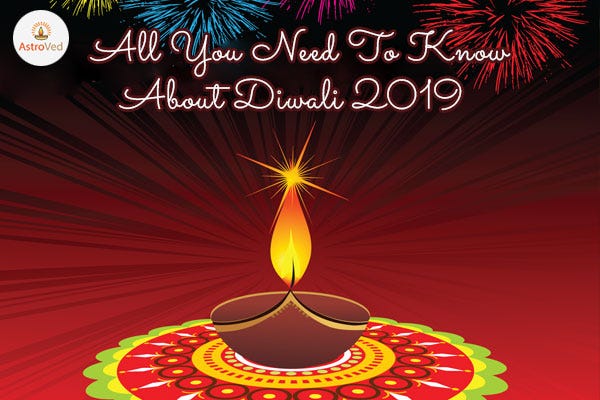The literal meaning of Diwali or Deepavali (in Sanskrit) means “a row of lights”. It is a five-day festival in most parts of India. It celebrates the triumph of good over evil like most Hindu festivals. Mythology has it that it celebrates the return of Lord Rama and his wife Sita from exile to their kingdom, Ayodhya after Rama had slain the demon Ravana who had kidnapped Sita.
Despite its festiva aura, Diwali is also a time to introspect in order to get rid of the darkness and inner demons within ourselves. It is a time to let in light and purify our souls.

Diwali Festival Dates
Diwali festival dates are based on the Hindu lunar calendar and falls in October or November. In 2019, Diwali begins with Dhanteras which falls on October 25 and ends on October 29. The major celebration is on the third day (October 27, 2019). In south India, Diwali is celebrated a day early, on October 26.
Where is it celebrated?
Diwali is a popular festival that is celebrated all over India. The only state where Diwali isn’t widely celebrated is the southern state of Kerala. The reason is that it is not part of the state’s culture and social fabric. Another explanation is that Diwali is a festival of wealth for merchants, whereas the Hindus of Kerala have not been very active in trade owing to its Communist legacy. But Diwali goes much before this.
There is a different meaning for each day of Diwali.
Dhanteras, the first day, marks the beginning of Diwali and celebrates wealth. On this day, people buy gold ornaments and new kitchen utensils. They also clean their homes preparing to welcome the goddess of wealth, Goddess Lakshmi. Friends and relatives come together to play cards and gamble.
The second day is called Naraka Chaturdasi in south India while in north India it is called Choti Diwali (Little Diwali). Colorful patterns called Rangoli are drawn in front of doorways and in the courtyards. Firecrackers are also burst. Supposedly, on this day, Lord Krishna and Goddess Kali killed the demon, Narakasura, and freed 16,000 princesses who had been held captive. Effigies of the demon are burned in Goa to celebrate the occasion.
The third day is the main day when lots of diyas (small clay lamps) and candles are lit and placed in front of houses. People also burst firecrackers which light up the night sky beautifully. This is why Diwali is called the “Festival of Lights”. Families get together and perform the Lakshmi Pooja. Gifts and sweets will be exchanged on the occasion. In Odisha, Assam and west Bengal, Kali Pooja is celebrated on this day. Sometimes, it may fall a day earlier depending on the lunar cycle. People worship Kali, the fearsome Goddess, as she has the power to destroy our ego and illusions.
Merchants open new accounts for the new year, and worship god on the fourth day. In north India, Govardhan Pooja is celebrated to commemorate Lord Krishna’s act of defeating Lord Indra, the rain god. In Tamil Nadu, Maharashtra and Karnataka, Lord Vishnu’s victory over Bali, the demon king, is celebrated as Bali Pratipada or Bali Padyami.
Bhai Dooj is celebrated on the fifth day which is also the last day. This day is dedicated to sisters. On this day, sisters and brothers get together and share food as a way of celebrating the bond between them.
Diwali Rituals
Diwali rituals vary in each region. But in most places, Goddess Lakshmi and Lord Ganesh are worshipped on Diwali. Myth has it that Goddess Lakshmi was created during the churning of the ocean on the main day of Diwali. It is believed that she visits people’s homes during Diwali, bringing prosperity and good fortune with her. Supposedly, she visits the houses which are the cleanest, first. Hence, people ensure that their houses are clean and spotless before they light lamps to invite her into their homes. This ritual of cleaning the home is also a symbol of the need to purify our minds which removes negativity, clutter and ignorance.
What Happens during the Festival
Diwali celebrations are filled with great joy and happiness as it is a family-oriented festival. The lights that illuminate the houses and the shops on the occasion give the entire city or town a warm and cheery aura. But there may be some loud noise from the firecrackers and the air will also be filled with smoke from them. This can cause breathing difficulties. Pets too will be affected by the loud noise.
Visitors to India during Diwali season must consider the fact that trains and flights will be booked well in advance and many popular tourist destinations will be very crowded.
Those with sensitive ears should carry ear plugs to protect their ears as some crackers make a deafening noise, like an explosion. Those visiting Delhi may need to wear a mask because of high levels of pollution.